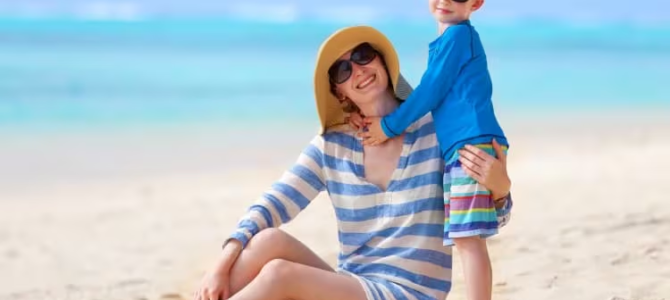July is UV Safety Awareness Month, and with summer in full swing, it’s the perfect time to think about protecting yourself and your loved ones from the sun’s harmful UV rays. In this blog, we’ll explore why UV safety is so important and give you some tips on how to enjoy the outdoors safely.
First of all, what is UV? Ultraviolet (UV) radiation is a type of energy that comes from the sun and can penetrate your skin, causing damage over time. There are three types of UV radiation: UVA, UVB, and UVC. UVC is absorbed by the Earth’s atmosphere, so we don’t need to worry about it. UVA and UVB, however, can cause damage to our skin and eyes.
Why is UV safety important? Exposure to UV radiation can cause a range of health problems, including skin cancer, cataracts, and eye damage. According to the American Cancer Society, skin cancer is the most common cancer in the United States, with more than 5 million cases diagnosed each year.
So, how can you protect yourself from UV radiation? Here are some tips:
1. Wear protective clothing. This includes hats with wide brims, sunglasses with UV protection, and long-sleeved shirts and pants made from breathable fabrics that provide UPF (Ultraviolet Protection Factor).
2. Use sunscreen. Apply sunscreen with a sun protection factor (SPF) of at least 30 to all exposed skin, including your face, ears, and the back of your neck. Be sure to reapply every two hours or after swimming or sweating.
3. Seek shade. Try to stay in the shade during peak UV hours, which are typically from 10 a.m. to 4 p.m.
4. Avoid tanning beds. Tanning beds expose your skin to UV radiation, which increases your risk of skin cancer and premature aging.
5. Get regular skin exams. Check your skin regularly for any new or unusual growths and see your medical provider if you notice anything that concerns you.
UV safety is especially important for those with darker skin tones, who may think they don’t need to worry about sun protection. However, while darker skin tones do have more natural protection against UV radiation, they are still at risk for skin cancer and other UV-related health problems.
It’s also important to think about UV safety for children. Childhood sunburns can greatly increase the risk of skin cancer later in life, so it’s crucial to protect children from the sun’s harmful rays. Infants under 6 months should always be kept out of direct sunlight, and older children should wear hats and protective clothing, and use sunscreen with an SPF of at least 30.
In addition to protecting yourself and your family from UV radiation, you can also take steps to promote UV safety in your community. MHEDS, the Multi-Cultural Health Education Delivery System, offers resources and education about UV safety and skin cancer prevention. They also provide free skin cancer screenings for those who may be at risk.
It’s never too late to start practicing UV safety. By taking steps to protect yourself and your loved ones from the sun’s harmful rays, you can greatly reduce your risk of skin cancer and other UV-related health problems. So don’t forget to wear protective clothing, use sunscreen, seek shade, avoid tanning beds, and get regular skin exams.
Sources
American Cancer Society. (n.d.). Skin Cancer. Retrieved from https://www.cancer.org/cancer/skin-cancer.html
Centers for Disease Control and Prevention. (2019). UV Safety. Retrieved from https://www.cdc.gov/cancer/skin/basic_info/sun-safety.htm
Multicultural Health Evaluation Delivery System https://mheds.org/


